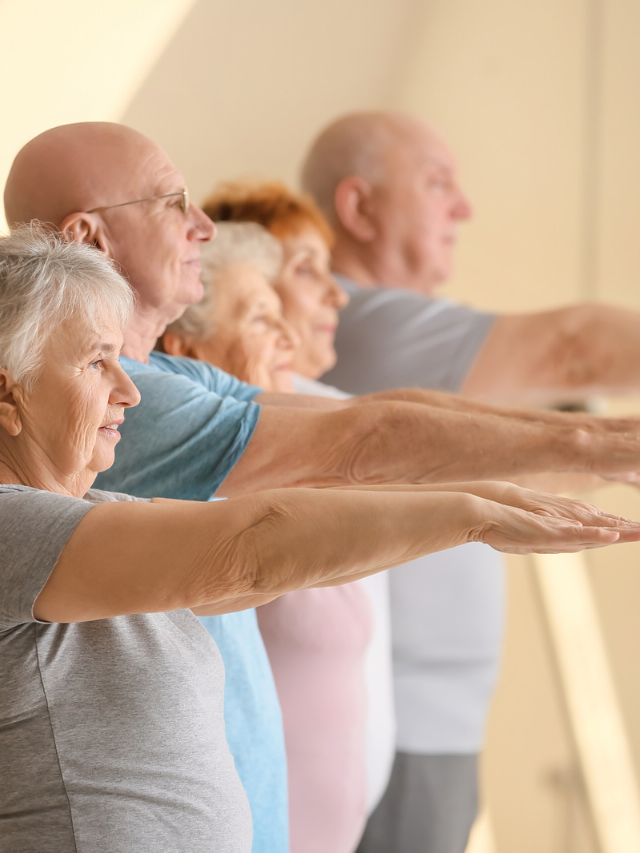As you have become older do you practice or have you ever considered starting yoga?
How we age is unique to each of us, and it can be a reflection on how we have engaged and continue to engage in life. There are many things that influence our experience of aging, such as our state of mind, our past and present lifestyle choices, past and present events, genetics, ethnicity, where we live, our underlying health status and so much more.
When I think about getting older a happy little birthday song comes into my mind, one that I sing to the grandies and some other lucky souls whom I hold close, and it starts like this….
“It’s your birthday, it’s your birthday, so have a happy day
You’re getting older, you’re getting older, you’re older every day” …. and so, on it goes….
It’s so true isn’t it! If we are alive aging is unavoidable, every day we get that little bit older.
As we move through what is a natural transition, science and the medical model give us measurable facts, statistics and theories that show when we age things begin to slow down.
Science tells us that bones thin, muscles weaken, and tendons become stiffer. The cushioning between the joints and vertebrae begin to flatten out and lose their plumpness, all contributing to slower movement that is often accompanied by pain and stiffness. Hearing and vision usually decline, and digestion slows and becomes erratic. Sleep patterns change or become disturbed giving way to poorer sleep quality. As a person ages the skin becomes thinner, memory loses its sharpness and anxiety can increase. Circulation slows, blood pressure can rise, and peripheral circulation may reduce…and as the Demtel man on the television adverts of 20 years ago would say “and there’s more!”
Eeek! Who wants to get older?
As my 92-year-old mother loves to tell us, with a great big smile, how her doctor keeps saying “there’s no cure for old age”.
These identified shifts in our being seem to tell a grim tale, but isn’t this is how aging goes? Isn’t this the way the body works in its natural process of slowing down.
We are born, we grow, life evolves and then suddenly we realise, Oh My Goodness What Has Happened! Suddenly we’re in the older bracket of life.
Maybe a life event or illness has suddenly confronted us, knocked the wind out of our sails and we realise “I’m not as resilient as I thought I was”, or “it’s taking longer for me to recover”. Maybe we find “I’m getting out of bed a bit stiffer, and I am tiring more easily”, yet it doesn’t mean that we cannot age well.
If we are lucky and live long enough the effects of aging are unavoidable and it’s a little sad when we have difficulty accepting that transition. Aversion and wanting to turn back the clock is an illusion. Aging is often feared especially now as we live in the high paced, high stressed environment of today, one that demands we keep up the pace and if we can’t then we feel less valued.
When we identify with our body, our job, our experiences, our stories (those stories we tell our self and the ones that are told to us), they become part of our suffering. Our beliefs frame how we see our self and begin to define who we think we are. The cause of suffering comes through misunderstanding (ignorance) Yoga Sutra 2:24 tasya hetuh avidyā.
Many of the changes in our body and mind are subtle, happening over a long period, and in our busy lives of “coming, going and doing” we don’t notice them, until suddenly something happens that grabs our attention, and our mind and body speaks in a louder voice saying, “Are You Listening Now!”.
 Pic from Canva
Pic from Canva
Many years ago, I came across a book by Andrew Matthews called Follow Your Heart, where Andrew tells the story of a frog.
In short it goes like this:
“If you take an intelligent, happy frog and drop him into a bucket of boiling water, what will the Frog do?
He Will Jump Out! Instantly, the frog decides “this is no fun – I’m out of here!”.
If you take that same frog and drop him into a bucket of cold water, put the bucket on the stove and gradually heat up the water, what then? The frog is relaxing in the water…in few minutes he says to himself: “It seems to be getting a little bit warm in here, then soon enough you have a cooked frog”.
Isn’t this life?
We get so comfortable we really don’t notice the subtle changes that are happening in our body and mind. It’s when we start to pretend that nothing has changed, we need to ask ourselves if it is because we don’t want anything to change. Is there a fear getting older?
Aging is unavoidable (for many of us). Change happens and it’s our ability to notice what is happening, along with our capacity to accept change that determines what happens next.
Within the practice of Yoga Therapy, one of the underlying principles is to put the appropriate steps in place to avoid, alleviate or slow the progression of the suffering that is yet to come and can possibly be avoided.
Yoga Sutra 2:16 heyum dukham anagatam The painful effects that are likely to occur should be anticipated and avoided. TKV Desikachar The Heart of Yoga
You can’t change your life, and in this regard, you are unable to change the fact that one is, or has aged, but you can change your perception of it. When we mistake the impermanent for permanent, we can then become confused about what is within our realm of doing and being at it causes us suffering. Yoga Sutra 2:5
You do not need to be young, bendy and stretchy to practice yoga. Sri Krisnamacharya would say “if you can breathe you can do Yoga”. There is no need to be able to twist yourself into difficult poses or practice complicated breath work to be able to receive the benefits from a yoga practice especially when it is designed appropriately for your capacity and age.
Mobility, flexibility and stability are the qualities that we aim to cultivate in classes aimed for the more mature age group. Starting at your place of comfort we gradually move towards improving your sense of health & wellbeing in a way that works for you.
“The success of Yoga must not be measured by how flexible your body becomes, but rather by how it opens your heart.” TKV Desikachar
(all pictures in this post are curtesy of Canva)

